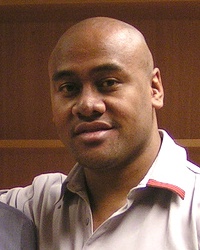A Quote by Jonah Lomu
Related Quotes
In the mid-1980s, operating problems took [nuclear] plants off-line so often that, on an annual basis, they operated at only about 55 percent of their rated total generating capacity. Today, as a result of several decades of experience and an intense focus on performance ... nuclear plants in the United States operate at over 90 percent of capacity. That improvement in operating efficiently is so significant in its impact that it can almost be seen as a new source in electric power itself.
Economists often talk about the 80/20 Principle, which is the idea that in any situation roughly 80 percent of the “work” will be done by 20 percent of the participants. In most societies, 20 percent of criminals commit 80 percent of crimes. Twenty percent of motorists cause 80 percent of all accidents. Twenty percent of beer drinkers drink 80 percent of all beer. When it comes to epidemics, though, this disproportionality becomes even more extreme: a tiny percentage of people do the majority of the work.
The Left doesn't realize that unless you create a formative culture and a critical consciousness capable of changing the way people think about the common sense assumptions that drive their lives, then you've got an ideological foundation for totalitarianism that not only destroys the capacity to think critically, it destroys the capacity to have convictions at all.
I was asked by an NPR reporter once why don't I talk about race that often. I said, 'It's because I'm a neurosurgeon.' And she thought that was a strange response... I said, 'You see, when I take someone to the operating room, I'm actually operating on the thing that makes them who they are. The skin doesn't make them who they are.'
I was asked by an NPR reporter once, why don't I talk about race that often. I said it's because I'm a neurosurgeon. And she thought that was a strange response. And you say - I said, you see, when I take someone to the operating room, I'm actually operating on the thing that makes them who they are. The skin doesn't make them who they are.



































